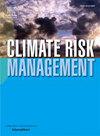Evaluating effectiveness of impact-based heatwave warnings for perceptions and risk-mitigating behaviors: Survey studies in South Korea
IF 5
2区 环境科学与生态学
Q1 ENVIRONMENTAL SCIENCES
引用次数: 0
Abstract
Excessive heat is a serious health hazard across the globe, and heat-related risks may continue to rise due to climate change. Impact-based warning (IBW) systems that provide information on the expected consequences of an impending weather event have the potential to reduce heat-related illness and death by allowing for adequate public responses and decision-making. This research evaluated the effectiveness of heatwave IBWs in South Korea, where heat is the leading cause of weather-related deaths. Two survey studies were conducted with nationally representative samples using actual heatwave warnings issued to the public. In Study 1, participants received either an IBW or a conventional phenomenon warning for a hypothetical scenario for a heatwave scenario with varying risk levels. IBWs were found to improve the perceived threat of the heatwave risk and credibility of the warned impacts, particularly for high-risk heatwaves, but did not lead to higher intentions to take risk-mitigating behaviors. Perceptions were positively associated with behavioral intention, suggesting that IBWs may still indirectly influence risk-mitigating behaviors. In Study 2, where real-time warnings were presented to participants during a low-risk heatwave, no differences in perceptions or behavioral intentions were found between the two warning types. Age and prior heatwave experience were associated with increased risk perception and behavioral intention but did not influence the effects of IBWs. These findings suggest that IBWs can be effective in enhancing risk perception, particularly under higher-risk conditions, but may have limited influence on behavioral responses.
评估基于影响的热浪预警对认知和风险缓解行为的有效性:韩国的调查研究
在全球范围内,过热是一个严重的健康危害,由于气候变化,与热有关的风险可能会继续上升。基于影响的预警(IBW)系统提供关于即将发生的天气事件的预期后果的信息,通过允许充分的公众反应和决策,有可能减少与热有关的疾病和死亡。这项研究评估了热浪ibw在韩国的有效性,在韩国,高温是与天气相关的死亡的主要原因。两项调查研究采用了具有全国代表性的样本,使用了向公众发布的实际热浪警报。在研究1中,参与者收到了不同风险水平的热浪假设情景的IBW或传统现象警告。研究发现,IBWs提高了热浪风险的感知威胁和预警影响的可信度,特别是对于高风险热浪,但并未导致采取风险缓解行为的更高意愿。认知与行为意向正相关,表明ibw仍可能间接影响风险缓解行为。在研究2中,在低风险热浪期间向参与者提供实时警告时,两种警告类型之间没有发现感知或行为意图的差异。年龄和先前的热浪经历与风险感知和行为意图增加有关,但不影响IBWs的效果。这些发现表明,ibw可以有效地增强风险感知,特别是在高风险条件下,但对行为反应的影响可能有限。
本文章由计算机程序翻译,如有差异,请以英文原文为准。
求助全文
约1分钟内获得全文
求助全文
来源期刊

Climate Risk Management
Earth and Planetary Sciences-Atmospheric Science
CiteScore
8.20
自引率
4.50%
发文量
76
审稿时长
30 weeks
期刊介绍:
Climate Risk Management publishes original scientific contributions, state-of-the-art reviews and reports of practical experience on the use of knowledge and information regarding the consequences of climate variability and climate change in decision and policy making on climate change responses from the near- to long-term.
The concept of climate risk management refers to activities and methods that are used by individuals, organizations, and institutions to facilitate climate-resilient decision-making. Its objective is to promote sustainable development by maximizing the beneficial impacts of climate change responses and minimizing negative impacts across the full spectrum of geographies and sectors that are potentially affected by the changing climate.
 求助内容:
求助内容: 应助结果提醒方式:
应助结果提醒方式:


